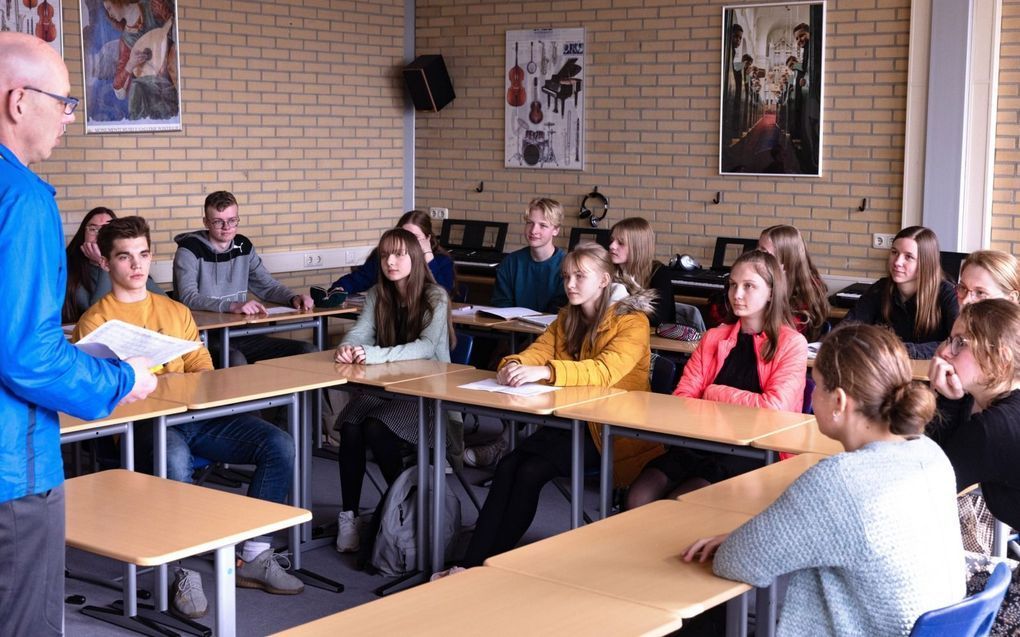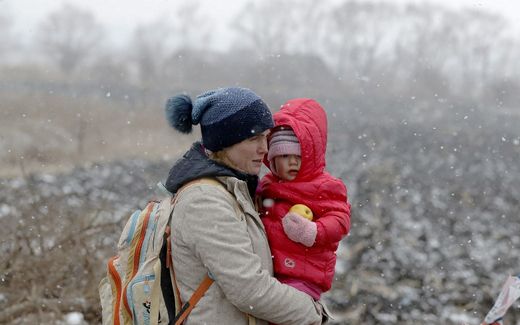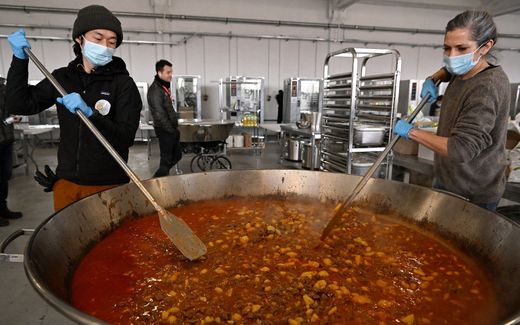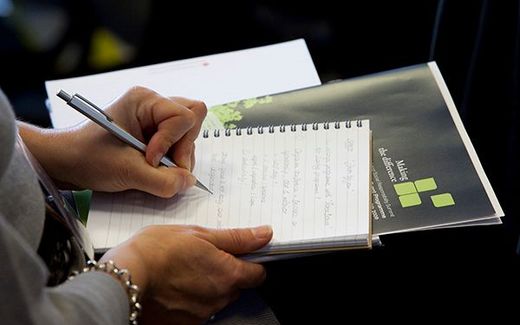Ukrainian youngsters welcomed at Reformed college in Holland
22-03-2022
Western Europe
Michiel Kerpel, RD

Ukrainian students (in the centre) at the Gomarus college. Photo Dirk Hol
Western Europe
Eight Ukrainian youngsters started this week at the Reformed Gomarus School Community in Gorinchem, the Netherlands. Seven more will follow next week. “I want to make them feel welcome.”
They are a bit shy: Katya Sedorenko (16), Julia Sevrukova (16) and Katya Boyka (13). But it’s also very overwhelming. They are being dragged from place to place. And then, during a break, they speak to a journalist.
Barely a week ago, the three arrived in the Netherlands. They had previously left their hometown of Zhytomyr in cars. “From the Polish border, we went to the Netherlands with large buses. We did not know where we would end up,” translates Marina.
Being a refugee feels very uncomfortable for the girls. “We miss our family. Our brothers and fathers who stayed behind.”
The girls say they like it here at the Gomarus school. “We have been received very warmly. There are good staff here: good teachers.”
Gymnastics teacher Pieter Kleppe has been busy with the Ukrainians in these first few days. He arranged their shelter on the Gomarus. “A big job. You do not know where to start. No one has ever done this.”
It soon became clear to Kleppe that socialising was the most important thing for Ukrainian youth. “Because the chance that they are only here for a short time is very small. This also became apparent yesterday when we spoke to the parents, especially the mothers, of the students. They said that maybe, they will always stay here.”
Buddies
But how do you go about socialising? “Contact with peers is crucial. That is why we have assigned a buddy to each young person. They will also have to learn the Dutch language. But you cannot do that in a week. Yet, some are already saying a few words.”
Language turns out to be a major barrier, says Kleppe. Because who speaks Ukrainian now? Fortunately, technical means offer a solution. The buddies are given a laptop and can translate what is on the board during the lectures via Google Translate. There are also translation apps that allow communication. “Furthermore, there are interpreters at the school. Speaking through them goes faster than with apps, and it is also nicer for the students.”

There were a lot of hurdles to overcome in the first week, Kleppe notes. “The refugees have very practical questions. How do I get a pen? A notebook? A backpack? Separate laptops are also required so that they can work more independently. They cannot get along with a Dutch keyboard. And the buddies all had to get the Wi-Fi password to get started with the translation apps on their phones.”
Kleppe indicates that he is grateful for what he can do for the Ukrainian students. “I see it as my joyful duty. The Word of God asks for mercy. We are now giving these concrete hands and feet. I do wonder: why now? And not with Syrian refugees? At the moment, no bridge seems too far and no mountain too high to offer help. But where were we then? Perhaps this will be a turning point.”
SayHi
Mieneke is one of the buddies. She stays around Katya Boyka all day long. “That’s how I tell her what we’re going to do. And during the lesson, I translate what is said. The language makes it difficult.” The SayHi app seems to be ideal. “You tap a button on the screen, and you can talk. The app translates what you say.”
She likes to be able to help. “Everything here is strange to them. I want to give them love and make them feel welcome.”
Sports hall
The sports hall next to the Gomarus was quickly converted last week to receive refugees. They stay here on simple stretchers and with a few square meters until a permanent residence has been arranged.
The local municipality asked the Gomarus to help provide breakfast, lunch and dinner for the refugees, says Jeannet Reijnders, who coordinates the “Gomarus in the neighbourhood”-project. “With that project, we also provide high teas in a retirement home, for example. Now the city council came up with this question. We were happy to help.”
In the coming period, all ninth graders will offer their help in the sports hall. The teacher thinks it is important for the education of the students. “They can mean something to their neighbour and get to work with other talents. They take this with them for the rest of their lives. You notice that they see how well they have it compared to the refugees.”
Heroes
“Here are our heroes”, points out Reijnders as she enters a conference room. Around the table are Marthe-Marie, Louise, Gertrude and Julia. The four students heard on Monday morning five minutes in advance that they would help the Ukrainians that day. The students say that the reception impressed them. Louise: “People had very little privacy. It was three screens and then two beds. No more. Very intense.” Marthe-Marie: “Yes. And when we left, we went to our own safe house. I could not get over that.” Gertrude: “And to think that some have to miss their father and brothers.”
The girls prepare a buffet for the refugees, among other things. Fruit, bread, all kinds of spreads, yogurt. They also played with children. Louise: “One of the refugees thanked us in Dutch for breakfast. Very cute!”
The foursome thought it was nice to mean something to the refugees. Julia: “On Sunday evening, I prayed with my parents if we could do something for Ukrainian refugees. And the next morning, this came unexpectedly. I thought that was very beautiful and special.”
This article was translated by CNE.news and previously published in Dutch daily Reformatorisch Dagblad on March 17th, 2022.
Related Articles





